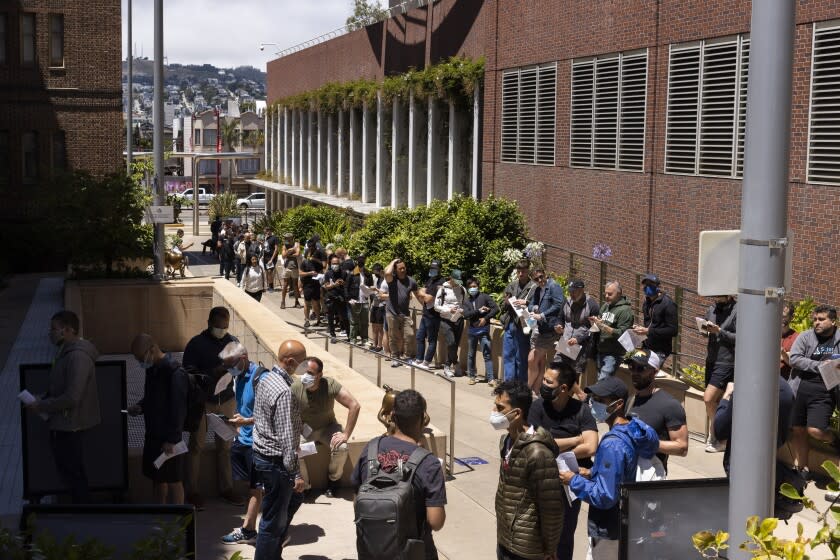San Francisco officials declare state of emergency as monkeypox spreads

- Oops!Something went wrong.Please try again later.
- Oops!Something went wrong.Please try again later.
San Francisco officials declared a state of emergency Thursday as the number of monkeypox cases hit 281 and continued to spread across the city.
Mayor London Breed and the city's Department of Public Heath made the declaration, which will allow officials to mobilize additional resources and to accelerate funding and emergency planning to combat the outbreak of the virus that is spreading almost exclusively among gay and bisexual men and transgender and nonbinary people.
LGBTQ activists and health leaders have been sounding the alarm about monkeypox for weeks, saying they were inadequately prepared and overlooked by public health officials. Now, many state and local officials are joining the call for a better response to the outbreak — especially, efforts to get more vaccines.
As of Thursday afternoon, San Francisco's health department reported 20 more monkeypox cases, including probable cases and those identified by the Centers for Disease Control and Prevention, bringing the total number of cases in the city to 281.
Breed said in a Thursday news conference that she sent a letter July 20 to the U.S. Department of Health and Human Services expressing an urgent need for vaccines in the city. San Francisco needs about 70,000 doses to meet the demand, Breed said, and some vaccine sites have had to be closed due to lack of supplies.
“We know the challenges of what happens in San Francisco when we put public health on the back burner,” Breed said. “We’ve seen this happen before in history during the AIDS crisis, when San Francisco was virtually left on its own to fend for itself to address what has became a real pandemic in this country.”
State Sen. Scott Wiener (D-San Francisco) condemned homophobia and stigma against gay men that he saw in response to the outbreak.
“I came of age as a gay man in 1987, when I was 17 years old, and it was at one of the worst points of the AIDS crisis,” Wiener said at the news conference. “This is like deja vu that, once again, gay men are getting attacked and demonized and blamed as we get sick.”
Dr. Susan Philip, the city's public health officer, noted that 30% of California's cases are in San Francisco.
"We have always been on the forefront of advocacy and action for LGBTQ+ health and I'm issuing this declaration to reaffirm our commitment to the wellbeing of these communities and to allow us to move more quickly to obtain and distribute the resources needed to help those disproportionately impacted,” Philip said in a statement.
In New York state, Health Commissioner Dr. Mary Bassett also declared monkeypox an “imminent threat to public health" Thursday. The declaration allows local health offices to use further resources to help distribute the monkeypox vaccine.
Monkeypox cases have continued to rise since late June in Los Angeles and San Francisco, coinciding with Pride weekends. Los Angeles reported 279 cases as of Thursday. There are 799 cases in California and more than 4,900 cases across the U.S., according to the CDC.
Monkeypox, a virus that originates in animals such as primates and rodents and sometimes jumps to people, was identified in 1958 and has mostly been found in central and west Africa. The disease belongs to the same family as smallpox but results in milder symptoms, including fever, body aches, chills and fatigue. Some people may develop lesions and a rash on the hands and face.
Since May, when the outbreak was first detected in the U.K., more than 70 countries where the disease is not endemic have reported a rise in cases.
U.S. health officials announced this week that about 800,000 doses of the monkeypox vaccine will be available to be distributed soon. The federal government has sent more than 310,000 doses of the Jynneos vaccine to health departments across the country, but clinics in major cities like San Francisco and New York say that it’s not enough.
San Francisco is expected to receive about 4,220 doses of the monkeypox vaccine this week, according to Breed's office. The city's public health department has requested 35,000 doses, only half of what Breed said the city truly needs, but still, officials said they have only received about 12,000, including this week's allocation.
Public health officials in Los Angeles County also said the number of doses they've been given doesn't meet the demands of their residents. When cases began appearing last month in L.A. County, about 1,000 vaccine doses had arrived from the federal government.
Around 24,000 doses have arrived in the county since then, but officials said that falls short of what's required to respond to the outbreak.
Last week, Dr. Mark Ghaly, the California health secretary, requested from the CDC an additional 600,000 doses for the state.
This story originally appeared in Los Angeles Times.

